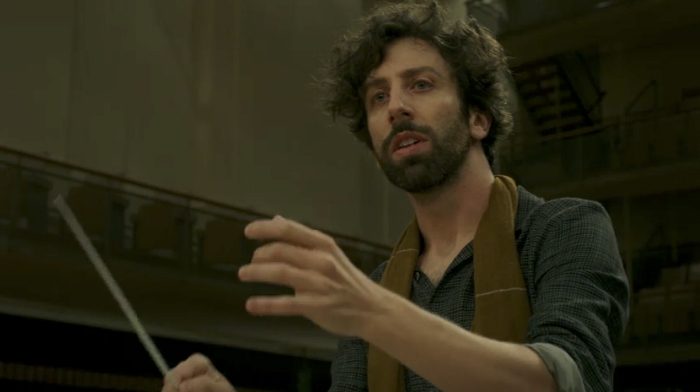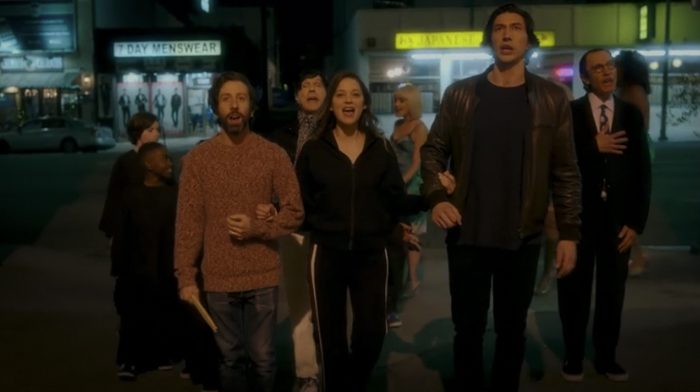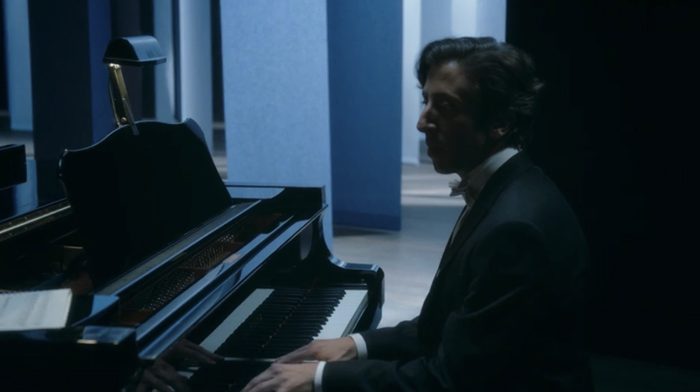
You likely know Simon Helberg from his work on The Big Bang Theory, but if you’re looking to see him stretch an entirely different set of acting muscles, you should check out Annette, the bizarre new musical written by pop band Sparks and directed by French filmmaker Leos Carax (Holy Motors).
Helberg plays an unnamed accompanist-turned-conductor with a complicated relationship to an opera singer. I recently had the chance to speak with him about learning how to actually conduct in preparation for the role, Carax’s “incredibly exacting” vision for the movie, and Helberg’s character’s unique relationship to the audience (he breaks the fourth wall and speaks directly to the viewer multiple times).
This interview has been edited for clarity and brevity.

Let’s start with that opening number, “May We Start,” which is this long continuous shot through the streets of L.A. I know you have experience singing before this movie, but what was that experience like for you in that opening song?
I actually don’t have a ton of experience singing. I have done it here and there. I’m not a trained singer, so I have to work real hard to crank it out. That one scene though, in particular, was just really fun because the song is so spectacular, and also it was the end of the shoot. [Nothing else we shot for the film] was in America, and so everybody came out at the very end in L.A. and walked down Santa Monica Boulevard singing and ducking down into an alley. It was really fun because we had shot it, and then here we are: we made it all the way to L.A. And Leos has done that – he had a scene in Holy Motors where there’s a musical interlude. I felt so excited to be a part of another one of his amazing films.
In that song, you have this little moment with drumsticks. Did you nail that every time? How many takes did you end up doing of that song?
[laughs] That was another thing Leos likes to do: surprise you at the last second. [He asked if I could] do this drumroll on the ground, and I was like, “Sure.” That was not that crazy. I do play a tiny bit of drums, so I guess it worked out. But that was a new thing. I don’t think I fucked up any of the takes with my drumroll on the concrete. But we probably did, jeez, maybe ten or fifteen takes. It was a huge shot, and you’ve got Steadicam walking backwards down the street, kids singing harmony, and a motorcycle at the end. But a lot of the film was like that: “Let’s do it in one, and here’s ten extra things that I never told you about that I’d like you to try.”
Speaking of long shots, you were also part of what might be the movie’s second-longest shot, in which the camera spins around your character while you’re conducting later in the film. What was your approach to that section of this story?
Well, I was made privy to the fact that Leos was going to do it in one and the camera would go around me. I was told that before I showed up, which is one of the few things I was told before showing up. But at the same time, I couldn’t really conceive of what it actually was going to be until I was there. My work for that scene was, I would say, pretty tireless. I learned how to conduct, and studied with different conductors, and watched endless amounts of videos of people conducting, and read about conductors, and tried to do the whole thing. Because I knew that when you show up to set, you better have it in your bones. There’s enough distraction to kill you there. So you’ve really got to be able to focus through all that. That one was incredibly demanding, I will say. But absolutely one of the most incredible experiences I’ve had making a movie. I was never frustrated, I was only trying to serve Leos’s very meticulous vision of what he wanted. It was incredibly exacting and choreographed, and then trying to find the life within those parameters for me and all the emotion, and of course having an orchestra who’s actually there playing and trying to get it all in one. But ultimately you kind of leave your body. There was a little bit of a fugue state element for me. Just trusting. I will say I left there having no idea if I did a good job. [laughs] I think maybe part of Leos’s intention is to kind of break you down past the point of self-consciousness. Maybe in that scene, at least. Or he was really trying to get to something that he wanted. But it felt very collaborative and exploratory, even in all of its minutiae.
Did you look to any outside inspiration to help inform your performance? I feel like I have a vague memory of a classic cartoon about a conductor with floppy hair that’s similar to yours, but I can’t quite place it.
Yeah, there’s a Bugs Bunny one where he’s conducting where he leaves the stage and his hand keeps going. In that one, or in one of the Bugs Bunny cartoons is the one you’re talking about, which is based on Leonard Bernstein, I think. I didn’t go to cartoons for this one, but I was tempted, because there’s also a great Jerry Lewis conducting scene. But I tried to be a little more grounded and authentic with it. The people who I kept coming back to were Leonard Bernstein; Gustavo Dudamel, who conducts the L.A. Philharmonic; Teodor Currentzis is one of the guys I obsessively watched. There’s another guy, Herbert von Karajan, he was like the German Bernstein. He worked to get that flop of hair that Bernstein had so effortlessly. Apparently Herbert von Karajan was obsessed – he would set up cameras and film himself conducting and post it as like, “caught in action!” but they were all set up. He was very obsessed with being on par with Bernstein. Anyway, there’s a vanity to some of these guys, and there’s always that hair that somehow ends up flopping around. I was inspired by Dudamel’s hair, particularly. But the world of the conductor is pretty fascinating.

You mentioned that Leos had these really exacting specifications. I’m curious about your relationship with Sparks. How closely were you able to work with them on the song “I’m an Accompanist” to make sure you were achieving what they had envisioned when they wrote that? It has its own very strange cadence.
Yeah, I was actually talking about that with them the other night. Maybe I waited too long. When I got the song, I heard the demo and there was a transcription, and I wanted to know how much freedom I had. It turns out, they don’t even read music. Ron was telling me the other night. Which is so amazing. And I’m not a great reader, either, so I felt like I was trying to do it as exact and close to the actual score that I had. That song is deceptively challenging. I never really got any insight or input from Sparks about it. I knew that they liked it. But it was really Leos that I was communicating with, and he doesn’t read music, either. It’s interesting to hear him talking about directing a musical where he doesn’t read music and he doesn’t play music. Sometimes there’s actually something really wonderful that can happen where you have a bit of that objectivity or that distance, where you don’t know the mechanisms that create the thing, but you have a vision for it. The friction between those two things can be really creative.
As an actor, did you make any distinction between the moments where your character is breaking the fourth wall and talking directly to the audience, versus the times when he is speaking with other characters within the movie? Your character has this unique relationship to the audience in that way.
There is this soliloquy element to some of the scenes I’m in, “I’m an Accompanist” and the conducting scene. Even though I’m not speaking to the camera. There is this distinction that I had to make and that Leos helped me make, which is: are you speaking to the audience? Are you speaking to yourself? Or are you even speaking, are we just hearing what you’re thinking? Of course, that’s a challenge to pull off as well. I actually do have to speak. But to me, it feels like you’re hearing the thoughts of this person. That does change the approach, and I think he really is the only character in the movie that allows you in in that way. It does feel like he’s opening up to the audience in a different way. And of course, there’s a moment at the end where we get that from Adam as well. But that was another exciting challenge: conducting that orchestra and trying to deliver an inner monologue externally.
***
Annette is currently streaming on Amazon Prime Video.
The post ‘Annette’ Actor Simon Helberg on Serving Director Leos Carax’s “Meticulous Vision” [Interview] appeared first on /Film.
from /Film https://ift.tt/3D4f0Vb
